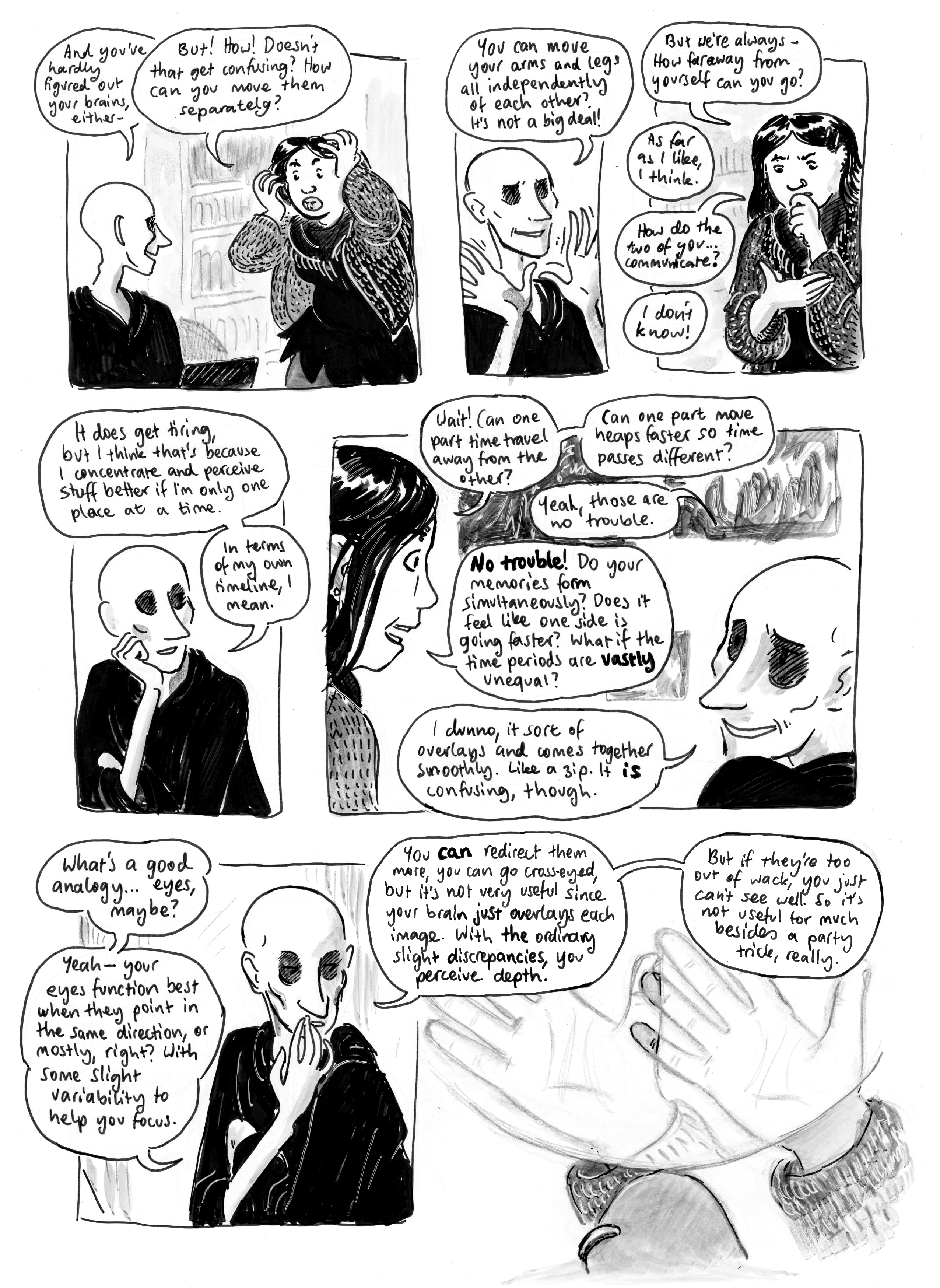Chapter: Chapter 43
↓ Transcript
Dee: And you've hardly figured out your brains, either-
Emily: But! How! Doesn't that get confusing? How can you move them separately?
Dee: You can move your arms and legs all independently of each other? It's not a big deal!
Emily: But we're always - How far away from yourself can you go?
Dee: As far as I like, I think.
Emily: How do the two of you... communicate?
Dee: I don't know! It does get tiring, but I think that's because I concentrate and perceive stuff better if I'm only one place at a time. In terms of my own timeline, I mean.
Emily: Wait! Can one part time travel away from the other? Can one part move heaps faster so time passes different?
Dee: Yeah, those are no trouble.
Emily: No trouble! Do your memories form simultaneously? Does it feel like one side is moving faster? What if the time periods are vastly unequal?
Dee: I dunno, it sort of overlaps and comes together smoothly. Like a zip. It is confusing, though. What's a good analogy... eyes, maybe? Yeah - your eyes function best when they point in the same direction, or mostly, right? With some slight variability to help you focus. You can redirect them more, you can go cross-eyed, but it's not very useful since your brain just overlays each image. With the ordinary slight discrepancies, you perceive depth. But if they're too out of wack, you just can't see well. So it's not useful for much besides a party trick, really.
----
Alt text: One time I went to an aquarium, and in an attempt to be interactive there was this ‘see like a fish!’ thing where you looked into a periscope that redirected each eye’s vision separately, to simulate the view of a fish with an eye on each side of its head. But fish brains wouldn’t overlay the two views like human brains do, so it was deeply unsuccessful.
Emily: But! How! Doesn't that get confusing? How can you move them separately?
Dee: You can move your arms and legs all independently of each other? It's not a big deal!
Emily: But we're always - How far away from yourself can you go?
Dee: As far as I like, I think.
Emily: How do the two of you... communicate?
Dee: I don't know! It does get tiring, but I think that's because I concentrate and perceive stuff better if I'm only one place at a time. In terms of my own timeline, I mean.
Emily: Wait! Can one part time travel away from the other? Can one part move heaps faster so time passes different?
Dee: Yeah, those are no trouble.
Emily: No trouble! Do your memories form simultaneously? Does it feel like one side is moving faster? What if the time periods are vastly unequal?
Dee: I dunno, it sort of overlaps and comes together smoothly. Like a zip. It is confusing, though. What's a good analogy... eyes, maybe? Yeah - your eyes function best when they point in the same direction, or mostly, right? With some slight variability to help you focus. You can redirect them more, you can go cross-eyed, but it's not very useful since your brain just overlays each image. With the ordinary slight discrepancies, you perceive depth. But if they're too out of wack, you just can't see well. So it's not useful for much besides a party trick, really.
----
Alt text: One time I went to an aquarium, and in an attempt to be interactive there was this ‘see like a fish!’ thing where you looked into a periscope that redirected each eye’s vision separately, to simulate the view of a fish with an eye on each side of its head. But fish brains wouldn’t overlay the two views like human brains do, so it was deeply unsuccessful.








